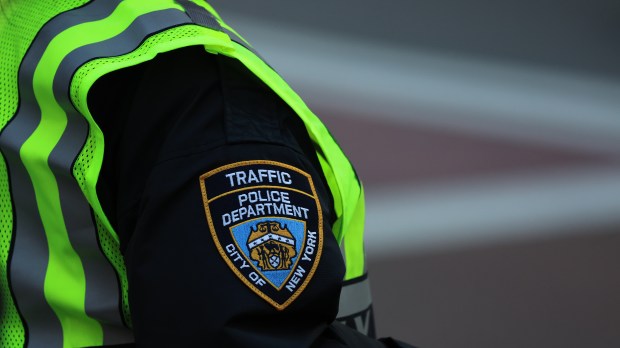They wear the same patch, but when they’re assaulted on the street, the differences between NYPD cops and
Traffic Enforcement Agents
become abundantly clear, the union representing TEA agents says, as it hopes to get peace officer status to better protect its members.
As civilian employees, not peace officers, TEA agents don’t have the same health benefits as cops when they’re injured on the job. Criminal charges against those who attack them would also be more severe,
Local 1182
President Alexander Sadik said.
“There is not a day that passes where our members aren’t harassed, mistreated or hospitalized because they were assaulted,” Sadik told the Daily News. “If my members were peace officers, if you touch them, that’s assault. Now, if you touch them, that’s harassment. That’s a big difference.”
“We are owned by the same department, so why is traffic enforcement being denied?” he asked.
The city’s 2,500 traffic enforcement agents, who are mostly immigrants and people of color, direct traffic and enforce parking rules in the city. Their salaries start at $41,493 and top out at $47,874.
They wear light blue uniforms — slightly different than NYPD officers — and the same NYPD patch with a rocker on the top indicating they are traffic enforcement.
“When the public needs help, they don’t see the difference on the patch,” Sadik said, pointing out that in May, when an Italian crypto currency trader
being held against his will and tortured inside a SoHo apartment
escaped his captors, he ran up to a traffic enforcement agent believing he was a cop. That agent quickly called police to the scene.
Yet the NYPD hasn’t given its traffic agents the equipment to protect themselves, Sadik claims. Meanwhile, his members are being accosted in the street.
Last Wednesday, a man doused a traffic agent with a bottle of juice in Brooklyn after the agent gave him a parking ticket near the corner of Seventh Ave. and Sixth St. in Park Slope. The man jumped into his vehicle and sped off and was still being sought by authorities Sunday.
In December, cops arrested Mark Garrido, who was accused of
attacking and robbing a traffic agent of his electronic summons book
after getting a ticket on a busy Queens street. Cops charged Garrido, 28, with robbery and assault.
In July 2022, a motorist
ran down a traffic enforcement agent
in Brooklyn with his Infiniti luxury car after the agent gave the driver’s friend a ticket, police said. That November, also in Brooklyn, a man outraged about getting a ticket
shoved a traffic agent to the ground and pummeled him
, according to police.
Sadik said clashes like these happen every day, and that many of these incidents go unreported.
One of the most egregious insults against city traffic enforcement agents
was committed by FBI agent Kenneth Diu,
who was accused of attacking an agent giving his Jeep a ticket while it was parked by a hydrant in Queens on April 18, 2022.
During the attack, Diu managed to void the ticket and then handcuffed the agent just as the agent’s supervisor arrived at the scene. The FBI agent was
charged with misdemeanor assault
, tampering with public records, computer tampering and obstructing governmental administration, cops said.
Diu ultimately pleaded guilty and was
sentenced to a conditional discharge,
which means his punishment did not involve jail or probation.
If traffic agents were given peace officer status, they would get unlimited sick leave if they were injured and needed hospitalization or physical therapy. Without it, traffic agents seriously injured on the job have to be back at work within 30 days or risk losing their jobs, Sadik said.
For the last two years, the union has
asked the NYPD to give its members body-worn cameras
, which would both record and deter the abuse agents receive daily from motorists. So far, they haven’t gotten them. Currently the only traffic agents with body-worn cameras are part of special NYPD quality of life enforcement teams, Sadik said.
The union is trying to determine how much it would cost to equip all its members with body-worn cameras themselves,
“If they give us cameras, they would see the reality,” said Sadik, who is also an
auxiliary NYPD police officer
, a volunteer who helps at parades and public events.
Auxiliary officers, he said, are given radios, batons and are offered self-defense classes — much more than his union members do.
“I don’t want a gun or a Taser. I just wanted to be treated like an auxiliary officer,” he said.
Getting peace officer status is an uphill climb. Besides getting approval from the city, traffic agents would need approval from the state and get new training outlined by the state’s Division of Criminal Justice Services, officials said.
Despite Sadik’s claims, the NYPD said assaults against traffic enforcement agents are down this year.
As of June 22, 10 agents reported being assaulted, four fewer than in the same time period last year, officials said.
In 2008, a state law was put in place so anyone arrested for attacking a city traffic agent
would face felony charges
and heavier penalties, the department said.
“The NYPD values the safety of traffic enforcement agents,” an NYPD spokesman said. “Assaulting a traffic enforcement [agent] carries the same consequence as assaulting a police officer or peace officer.”








